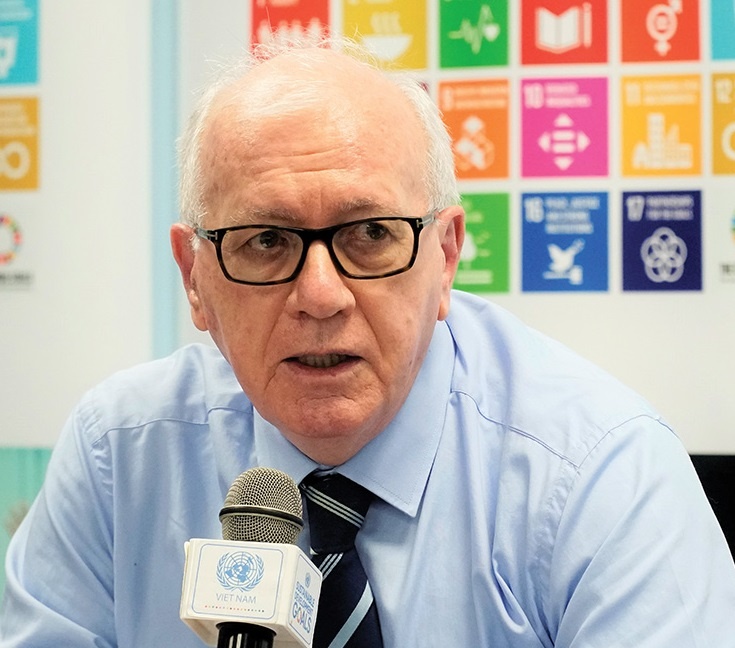Drawing out the impact of vital pandemic support
 |
| Terence D. Jones - Resident representative a.i. UN Development Programme |
The government has taken timely action to reduce the suffering of households that are without income due to loss of employment or earnings from self-employment. However, there is evidence that the support package is neither large enough, nor broad enough in scope to protect vulnerable households from income loss resulting from lockdowns and social distancing.
A recent survey carried out by the Centre for Analysis and Forecasting of the Vietnam Academy of Social Sciences found that the rate of transient income poverty surged from under 10 per cent pre-crisis to 33.4 per cent in August 2021, based on the 2021-2025 poverty line issued by the Ministry of Labour, Invalids, and Social Affairs (MoLISA).
According to this report, 90 per cent of respondents had not received support since the July 2021 package was approved, and that migrants, the self-employed, and the homeless were not eligible for benefits. Thousands of households have resorted to reducing food consumption, including milk for infants and children.
An evaluation report of Resolution 68 carried out by the Institute of Labour, Science, and Social Affairs under the MoLISA confirms that the coverage rate of cash assistance programmes is low because the programme design excludes vulnerable groups such as migrants without registration status and self-employed workers in the informal sector.
The report also notes that coverage varies among provinces because the programme relies on local authorities to mobilise funding. Cumbersome regulations for recipients and employers have also reduced coverage and disbursement rates.
Vietnam’s fiscal response to the crisis is small relative to neighbouring countries. The rationale for the limited fiscal effort is the need to contain government budget deficits to prevent the debt-to-GDP ratio from rising and potentially causing inflation and balance of payments deficits. While this logic holds during normal times, it should be recognised that social distancing and lockdowns are a very unusual situation that calls for extraordinary measures.
While in most years, growth of private consumption accounts for 60 to 70 per cent of aggregate economic growth, during lockdowns consumption is suppressed by restrictions on movement and closures of restaurants and retail outlets. Consumption contributed relatively little to output growth in 2020 as households were forced to rein in spending during the pandemic. Consumption recovered in the first half of 2021, but we can expect a steep drop in spending in the second half as households cope with restrictions to control the spread of the latest wave of infections. To achieve the twin objectives of supporting vulnerable households and stimulating economic growth, the cash assistance programme should be launched as quickly as possible.
The quickest way to deliver this support is to provide an immediate child benefit to children under six years old (about 11 million children); pregnant women; elderly people from 60 years of age (about 11.5 million older people); and people with disabilities.
Administrative requirements should be kept to a minimum, and an electronic register of individuals should be compiled listing households and individuals who have received support. Cash assistance can be delivered monthly or in one payment for the final three months of 2021.
Private consumption will be suppressed in the second half of the year in Vietnam, which will reduce incomes, employment, and tax revenue. To counter the effects of forced saving, the UN Development Programme proposes a cash assistance programme of 5 per cent of quarterly GDP, to be implemented as soon as possible in the final months of 2021.
The emphasis of this programme should be on rapid disbursement, especially to people who are currently suffering from extremely difficult circumstances due to the pandemic. A universal cash transfer for the elderly and children would achieve this immediate objective. Also, medium-term support policies need to be designed now to prepare for the possibility of further lockdowns and social distancing measures in the future.
What the stars mean:
★ Poor ★ ★ Promising ★★★ Good ★★★★ Very good ★★★★★ Exceptional
Themes: COVID-19
- 67 million children missed out on vaccines because of Covid: UNICEF
- Vietnam records 305 COVID-19 cases on October 30
- 671 new COVID-19 cases recorded on October 1
- Vietnam logs additional 2,287 COVID-19 cases on Sept. 21
- People’s support decisive to vaccination coverage expansion: official
Related Contents
Latest News
More News
- Vietnam ready to increase purchases of US goods (February 04, 2026 | 15:55)
- Steel industry faces challenges in 2026 (February 03, 2026 | 17:20)
- State corporations poised to drive 2026 growth (February 03, 2026 | 13:58)
- Why high-tech talent will define Vietnam’s growth (February 02, 2026 | 10:47)
- FMCG resilience amid varying storms (February 02, 2026 | 10:00)
- Customs reforms strengthen business confidence, support trade growth (February 01, 2026 | 08:20)
- Vietnam and US to launch sixth trade negotiation round (January 30, 2026 | 15:19)
- Digital publishing emerges as key growth driver in Vietnam (January 30, 2026 | 10:59)
- EVN signs key contract for Tri An hydropower expansion (January 30, 2026 | 10:57)
- Vietnam to lead trade growth in ASEAN (January 29, 2026 | 15:08)

 Tag:
Tag:

















 Mobile Version
Mobile Version